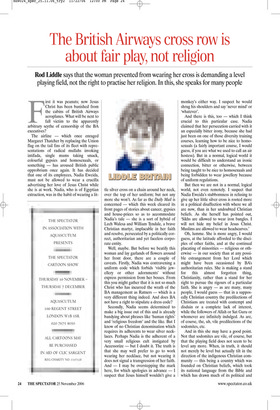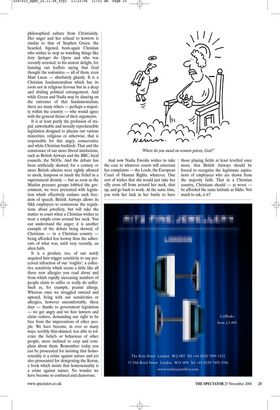The British Airways cross row is about fair play, not religion
Rod Liddle says that the woman prevented from wearing her cross is demanding a level playing field, not the right to practise her religion. In this, she speaks for many people First it was peanuts; now Jesus Christ has been banished from the cabins of British Airways aeroplanes. What will be next to fall victim to the apparently arbitrary scythe of censorship of the BA executives?
The airline — which once enraged Margaret Thatcher by replacing the Union flag on the tail fins of its fleet with representations of radical mullahs invoking intifada, single mums taking smack, colourful gypsies and homosexuals, or something — has aroused British public opprobrium once again. It has decided that one of its employees, Nadia Eweida, must not be allowed to wear a crucifix advertising her love of Jesus Christ while she is at work. Nadia, who is of Egyptian extraction, was in the habit of wearing a lit tle silver cross on a chain around her neck, over the top of her uniform; but not any more she won’t. As far as the Daily Mail is concerned — which this week cleared its front pages of stories about cancer, gypsies and house-prices so as to accommodate Nadia’s tale — she is a sort of hybrid of Lech Walesa and William Tyndale, a brave Christian martyr, implacable in her faith and resolve, persecuted by a politically correct, authoritarian and yet faceless corporate entity.
Well, maybe. But before we beatify this woman and lay garlands of flowers around her front door, there are a couple of caveats. Firstly, Nadia was contravening a uniform code which forbids ‘visible jewellery or other adornments’ without express permission from her bosses. From this you might gather that it is not so much Christ who has incurred the wrath of the BA management as Ratners — which is a very different thing indeed. And does BA not have a right to stipulate a dress code?
Secondly, Nadia seems determined to make a big issue out of this and is already bandying about phrases like ‘human rights’ and ‘religious freedom’ and the like. But I know of no Christian denomination which requires its adherents to wear silver necklaces. Perhaps Nadia is the adherent of a very small religious cult instigated by Accessorize — but I doubt it. The truth is that she may well prefer to go to work wearing her necklace, but not wearing it does not signal a transgression of her faith. And — I may be overstepping the mark here, for which apologies in advance — I suspect that Jesus himself wouldn’t give a monkey’s either way. I suspect he would shrug his shoulders and say ‘never mind’ or ‘whatever’.
And there is this, too — which I think crucial to this particular case. Nadia claimed that her persecution carried with it an especially bitter irony, because she had just been on one of those diversity training courses, learning how to be nice to homosexuals (a fairly important course, I would guess, if you are what we used to call an air hostess). But in a normal, logical world it would be difficult to understand an ironic connection, bitter or otherwise, between being taught to be nice to homosexuals and being forbidden to wear jewellery because of uniform regulations.
But then we are not in a normal, logical world, not even remotely. I suspect that Nadia Eweida’s stubbornness in refusing to give up her little silver cross is rooted more in a political disaffection with where we all are now, than in her undoubted Christian beliefs. As she herself has pointed out, ‘Sikhs are allowed to wear iron bangles. I will not hide my belief in Jesus Christ. Muslims are allowed to wear headscarves.’ Oh, lumme. She is more angry, I would guess, at the latitude afforded to the disciples of other faiths, and at the continual placating of minorities — religious or otherwise — in our society than at any possible estrangement from her Lord which might have been occasioned by BA’s authoritarian rules. She is making a stand for this almost forgotten thing, Christianity, rather than a stand for her right to pursue the rigours of a particular faith. She is angry — as are many, many people, I would guess — that in a supposedly Christian country the predilections of Christians are treated with contempt and disdain or a complete lack of interest, while the followers of Allah or Sat Guru or whomever are infinitely indulged. As are, of course, the, uh, vile predilections of the sodomites, etc.
And in this she may have a good point. Not that sodomites are vile, of course, but that the playing field does not seem to be level any more. When, in truth, it should not merely be level but actually tilt in the direction of the indigenous Christian community — this being a country which was founded on Christian beliefs, which took its national language from the Bible and which has drawn much of its political and philosophical culture from Christianity. Her anger and her refusal to kowtow is similar to that of Stephen Green, the bearded, bigoted, born-again Christian who wishes to stop us watching things like Jerry Springer the Opera and who was recently arrested, to his utmost delight, for handing out leaflets saying that God thought the sodomites — all of them, even Matt Lucas — absolutely ghastly. It is a Christian fundamentalism which has its roots not in religious fervour but in a deep and abiding political estrangement. And while Green and Nadia may be dancing on the extremes of that fundamentalism, there are many others — perhaps a majority within the country — who would agree with the general thrust of their arguments.
It is at least partly the profusion of stupid, unworkable and morally reprehensible legislation designed to placate our various minorities, religious or otherwise, that is responsible for this angry, conservative and white Christian backlash. That and the connivance of our more liberal institutions, such as British Airways and the BBC, local councils, the NGOs. And the debate has been artificially skewed; for a century or more British atheists were rightly allowed to mock, lampoon or insult the belief in a supernatural divinity — but as soon as the Muslim pressure groups lobbied the government, we were presented with legislation which effectively outlaws such freedom of speech. British Airways allows its Sikh employees to contravene the regulations about jewellery, but will take the matter to court when a Christian wishes to wear a simple cross around her neck. You can understand the anger; it is another example of the debate being skewed, of Christians — in a Christian country being afforded less leeway than the adherents of what was, until very recently, an alien faith.
It is a product, too, of our newly acquired hair-trigger sensitivity to any perceived infraction of our ‘roights’; a collective sensitivity which seems a little like all those new allergies you read about and from which rapidly increasing numbers of people claim to suffer or really do suffer. Such as, for example, peanut allergy. Whereas once we struggled onward and upward, living with our sensitivities or allergies, however uncomfortably, these days — thanks to government legislation — we get angry and we hire lawyers and claim redress, demanding our right to be free from the imprecations of other people. We have become, in ever so many ways, terribly thin-skinned, less able to tolerate the beliefs or behaviour of other people, more inclined to carp and complain about them. Remember: today you can be prosecuted for insisting that homosexuality is a crime against nature and yet also prosecuted for denigrating the Koran, a book which insists that homosexuality is a crime against nature. No wonder we have become so confused and clamorous. And now Nadia Eweida wishes to take the case to whatever courts will entertain her complaints — the Lords, the European Court of Human Rights, whatever. One sort of wishes that she would just take her silly cross off from around her neck, shut up, and go back to work. At the same time, you wish her luck in her battle to have those playing fields at least levelled once more, that British Airways should be forced to recognise the legitimate aspirations of employees who are drawn from the majority faith. That in a Christian country, Christians should — at worst be afforded the same latitude as Sikhs. Not much to ask, is it?



























































































 Previous page
Previous page